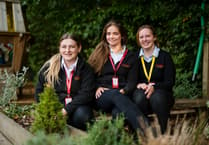Result!
My eldest granddaughter has received her GCSE results. And very good they are. The whole family are very proud of her.
This enabled me to write some words of Lewis Carroll in her congratulatory card. It permitted me to declare the day of the results as being a frabjous day, and to chortle in my joy: callooh callay.
I had to explain to her that it was from Through the Looking Glass and that even Alice is quoted as saying she “couldn't make it out at all”.
I fear that, like the tales of Christopher Robin and Pooh, the stories of Alice have become Disneyfied and many memorable – if totally incomprehensible – words and phrases have been lost. Today it is thought that only Roald Dahl and Terry Pratchett made up words – apart from Shakespeare, of course.
I had to turn to my Complete Works of Lewis Carroll to check those quotations, from Jabberwocky, and found that the book was a gift from my father for Christmas when I was six years old. He must have had high hopes for me to give me such a book at such an age.
I suppose these days most people just think of Carroll as writing the Alice books: In Wonderland and Through the Looking Glass. They don't recall The Hunting of the Snark, or Sylvie and Bruno, the assorted verses, stories, and puzzles.
I really must get around to reading some of those writings towards the end of the Complete Works! More about Me
As I have had so many positive and supportive wishes concerning my illness I do not feel bad about recounting some further news on that front.
As a result of my treatment at the Royal Surrey Hospital, Guildford, on Wednesday 28 August my left arm looked like Gorbachev's birth-marked head.
So I was pleased that when returning to RS the following day for blood tests no cannula was used but instead dainty butterflies were inserted into my arm on the thinnest of needles, thus leaving but a pin prick – needle prick – behind.
I wondered whether, if I fluttered my arm to which the butterfly was attached, I might cause chaos at St Peter’s Hospital all the way away in Chertsey.
Perhaps the butterfly chaos effect is not so far fetched, for I was reading that when it rains heavily in the Sumatran rainforest there is a corresponding drought in East Africa – some 3,700 miles away.
Who knew that? Apart, possibly, from the inhabitants of those parts. But then only if they signalled from Indonesia to Africa to warn of the forthcoming dry weather. Oh, the things I pick up from reading newspapers and magazines!
My youngest, over from Holland to help keep an eye on me, drew my attention to the number of people in the restaurant at lunch time when, presumably, most of the workers stopped for lunch.
Indeed, we passed a door with a very official looking notice on the door stating that the office was closed to preserve the 12.30 – 1.30 lunch hour.
I may have not have recalled the exact wording, but you get the gist: that hour is Special and must be Kept Special.
My daughter and her family recently went on a long drive from the Netherlands to Poland, and back. Her husband pointed out that HGV drivers have to abide by an EU rule that they must have a 45-minute break after driving for 4.5 hours.
The “black box” tachograph records various data about the vehicle’s operation, including speed, distance and driver activity, to ensure compliance with driving regulations.
Doctors, with our lives in their hands, are expected to continue almost non-stop – after all, there are 24 hours in a day. We saw more than one person, in scrubs, apparently sleeping in a parked car.
Yet we also noticed how smiley everyone seemed to be. No forced smiles, but genuine. They must get job satisfaction at that place. We're Open!
St Mary's Church, Church Road, Byfleet, KT14 7NF will be open on 8 September between 2pm and 5pm with guided tour of the church and churchyard at 3.30pm. I've been there, done it – it is fascinating.
Another church open as part of the Heritage Open Days is St Mary's, Horsell, GU21 4QQ, which will be open to the public on Saturday 14 September from 10am to 4pm.
This is a great opportunity to explore the historical aspects of the church and learn more about its significance in the community and, if you are up for it, climb the tower, from which you will get a great view of he Towers of Woking. Or you can look in the opposite direction. Where the Bee Sucks
The colour of the common has changed of late, parts are now covered in purplish pink – heather.
This is the best time to visit the areas of lowland heath to see the ling in full bloom – and the air scented like a jar of local heather honey and full of the buzzing of the bees.
I well remember, as a child, walking with my father on the common and being told of the three varieties of heather to be found there.
There is bell heather with rich magenta bells and which is the first to bloom.
Cross-leaved heath is so called because its tiny leaves grow in a whorl of four up the stem. The soft pink bells cluster at the top of the stem atop the grey green leaves.
Common heather flowers in August with its pale mauve flowers growing all the way up the stem. At first you notice a sea of ling then you see the subtle changes of mauve and discoverer the bell and cross-leaved varieties.
These heathers are key to the sandy, acidic soils of lowland heath and provide the ideal habitat for rare endangered species including the migrating nightjar, the Dartford warbler, woodcock, stonechat and woodlark, and many invertebrates including the rare silver-studded blue butterfly.
And spiders – my father would delight in pointing out the little spider nests on the heather stems: some looking like small balls of mud. He would carefully cut a nick in one and out would spill a million tiny spiders. Well, I didn't count them, but there were a lot.
Without the spiders where would we get that other beauty of this time of year – the dew-spattered cobwebs catching the sunshine like jewels and the small flies.
The first person to walk down the garden in the morning is best advised to hold a hand in front of the face to prevent becoming enmeshed in one of these amazing pieces of engineering.
Spiders are not the only creatures to float around on gossamer wings – but not to the moon, as the song has it. Other small invertebrates take to the air in this way, especially those very small green caterpillars.
Not interested in weaving webs they dangle on a single thread and go where the wind takes them – the outside of my bedroom window gets festooned with such dainty strands.
Sidetracking once more, as I tend to do – particularly whilst walking on the common – I will make a brief mention of the Caterpillar Club, which is a group of people who have successfully used a parachute to save their lives. The membership grew considerably during and after the war.
The careful, and ongoing, work by Horsell Common Preservation Society (HCPS) has ensured that the heathers continue to thrive. What would happen if we just let nature get on with it?
Pine and silver birch scrub would very quickly take over the whole common. Once the light and warmth is blocked, heather disappears along with all the wildlife it supports. Woodland management and cutting back old woody heather and clearing some areas all by scraping the top surface allows new heather to regenerate.
Lowland heath is rare and disappearing. Upland heath is more widespread in Scotland and high moorland and also supports heather. In coastal areas such as Cornwall the heather and gorse make a beautiful mosaic of low-growing cushions compared with the ragged growth of gorse on the common and the woody appearance of old heather.
Horsell Common is one of several fragmented areas of lowland heath in the Thames Basin with Chobham and Wisley Commons close by. This lowland heath is now so precious that it is managed by wildlife trusts, HCPS , Natural England and Thames Basin Heaths Partnership.
How can you help? Enjoy walking on the common but please do not have barbecues or carelessly throw away a cigarette. Fire spreads quickly and destroys much of the wildlife.
Fire also travels underground, another point made by my father, who would show me sites of presumably burnt-out land where a light breeze – or slight movement of the earth, as with a sharp heel, could cause the fire to re-ignite.
Along with the heathers, the blackberries are at about their best now, and are free for the picking. There is an old superstition that they should be gathered before Michaelmas Day, 29 September, after which day the devil curses them.
Why? I have found one theory is that when Lucifer landed on the floor of Hell, bottom first of course, he landed in a thorny blackberry bush and, unsurprisingly, cursed it.
Now a Devil's curse must be a really strong curse. But I cannot fathom what a blackberry bush was doing growing and, presumably, flourishing in Hell.
Those luscious blackberries can be frozen and used in winter from frozen, with Bramley apples, for delicious fruit pies.
You can further your enjoyment of the common by finding out more: join a volunteer working party, or help to protect the ground-nesting birds by keeping to the paths!
For more information, visit the Horsell Common website at horsellcommon.org.uk





Comments
This article has no comments yet. Be the first to leave a comment.